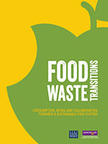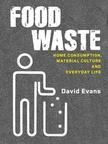















Households, Retailers and Food Waste Transitions
Funded by Economic and Social Science Research Council and the Sustainable Consumption Institute, Jan 2014-June 2015.
Project Final Event: Food Waste Transitions
To mark the end of the ‘Households, Retailers and Food Waste Transitions’ research project the SCI held a finale event in London on 9th June. The stakeholder event brought together an invited audience of over 80 policy makers, academics, business people and NGOs to discuss
The round table discussion was led by a panel including Dr. Tim Fox (Fellow and former Head of Energy and Environment, the Institute of Mechanical Engineers & Global Ambassador, Dearman), Mark Driscoll (Head of Food, Forum for the Future), Mark Little (Head of Food Waste Reduction, Tesco), Emma Marsh (Head of Love Food Hate Waste, WRAP), Louise Nicholls (Head of Responsible Sourcing - Plan A & Packaging Technology, Marks and Spencer) and SCI project lead Dr. David Evans.
The event also saw the launch of the project’s stakeholder report ‘Food Waste Transitions: Consumption , Retail and Collaboration towards a Sustainable Food System’. Baroness Scott of Needham Market (Chairman, House of Lords European Union Sub-Committee on Agriculture, Fisheries, Environment and Energy, 2013–15) kindly offered an endorsement of the report:
“Food waste poses a significant challenge to the sustainability of food systems. In addition to the environmental and economic impacts of the food we waste, there are significant social costs that need to be addressed as a matter of urgency. The burden of responsibility for making the necessary changes is often placed on households and consumers. However, successful responses require collaboration across the supply chain. This must-read report shows that consumption matters, but highlights its relationships with the component parts of the food chain and the organisation of societies more generally. It acknowledges that the United Kingdom is leading the way in collaboration for waste reduction and notes that retailers are starting to take their responsibilities seriously. The authors identify the conditions that have enabled this to happen in relation to food waste and ask how these might inform thinking about the wider issue of a transition towards a sustainable food system.”
The project team would like to thank Baroness Scott, the speakers and delegates and that made the final event of the project such a productive and enjoyable experience.
Read more about the event here.
The Project
In recent years food waste has been identified as a major sustainability issue, encompassing environmental impact, global food security and issues of social equity. According to the recent House of Lords report [PDF] “consumers in industrialised countries waste almost as much food as the entire net food production of sub-Saharan Africa”. The Institute of Mechanical Engineers estimate that worldwide 30–50% (or 1.2–2 billion tonnes) of all food produced never reaches a human stomach. Eliminating avoidable food waste in the UK (4.2 m tonnes) would be the equivalent reduction in greenhouse gas emissions as taking 1 in 4 cars off the road, according to WRAP.
This research and knowledge exchange project explores the ways in which the challenge of food waste reduction is being framed, interpreted and responded to by stakeholders. Key informant interviews were conducted with 38 stakeholders in the area, including grocery retailers, consultants, policy makers, charities, NGOs, and third sector organisations. In addition the project team attended several stakeholder events and conducted secondary data analysis.
The project also builds on previous research at the Sustainable Consumption Institute in order to develop social scientific understandings of household food waste. The project team have analysed existing data from a survey of c.70,000 Tesco customers as well as re-visiting the SCI’s 2012 survey of eating habits in the UK (completed by c.1500 online panel members) in order to explore the relationships between the organisation of meal occasions, the production of leftovers, and waste generation.
Stakeholder Workshop
On November 7th 2014 the project held a multi-stakeholder knowledge exchange workshop to develop state of the art thinking about food waste and identify innovative practical mechanisms for its reduction. The workshop brought together over 40 key stakeholders, including policymakers, representatives of third sector organisations, UK supermarkets and campaigners, consultants and academics from across the UK and Europe.
The central themes of the workshop were the relationship between research and policy, and evidence and action with a key aim to facilitate networking between delegates. As well as group workshop activities key note presentations were given by WRAP researcher Dr. Tom Quested and Programme Manager Andrew Parry on the agency’s evidence base, and by Dr Julian Parfitt (Anthesis Group), special advisor to House of Lords Inquiry into EU food waste prevention, on ‘Closing the gap between policy and evidence gathering’.
Find out more about the workshop here.
Publications
Evans, D. and Welch, D. (2015) 'Food Waste Transitions: Consumption, Retail and Collaboration Towards a Sustainable Food System,' Final stakeholder report
Evans, D. (2015) Researching (with) major food retailers: levelling and leveraging the terms of engagement, Gastronomica: The Journal of Critical Food Studies 15(3): 33-39
Southerton, D. and Yates, L. (2015) ‘Exploring Food Waste Through the Lens of Social Practice Theories: Some Reflections on Eating as a Compound Practice’ in E. Ekstrom (ed.) Waste Management and Sustainable Consumption: Reflections on Post-Consumer Waste. London: Routledge
Evans, D. (2014) Food Waste: Home Consumption, Material Culture and Everyday Life, London and New York: Bloomsbury Academic.
Conference Presentations
Whillans, J. and Evans, D. (2015) "From the meal occasion to the kitchen bin" 21st Century Thrift: An Intellectual Archaeology. Revolutionary Radicalism of Social Conservatism? 8 May 2015; London (by invitation)
Swaffield, J., Welch, D. and Evans, D. (2014) ‘Responsible Consumption: retailers, the ‘citizen-consumer’ and food waste reduction in the UK’. European Sociological Association Midterm conference: Research Network of Sociology of Consumption. University of Porto, O’Porto, 6 September 2014.
Swaffield, J., Welch, D. and Evans, D. (2014) ‘Reducing Food Waste through Redistribution: Retailers, Consumers and the Politics of Surplus Management’. Food Justice: Knowing food/ securing the future. University of Reading, 17 July 2014.
Evans, D. (2014) ‘New directions in food research’, invited contribution to a panel discussion at the British Sociological Association Food Studies Group conference. London, 30 June 2014
Welch, D., Swaffield, J. and Evans, D. (2014) ‘Food Waste Transitions: the role of retailers and other collective actors’ British Sociological Association Food Study Group Conference. London, 30 June 2014.
Evans, D. 'Commerical Collaboration and Critical Engagement: researching (with) major food retailers', Association for the Study of Food and Society (ASFS) Conference, University of Vermont, 19 June 2014.
Evans, D. (2014) 'Kitchen Secrets: the challenge of researching food practices', by Invitation, Open University (Sociology), May 2014.
Links
'Who is responsible for household food waste?' by Dan Welch 14 July 2015
'The Food Waste Crisis' by Joanne Swaffield, Manchester Policy Blogs, 25 June 2014





